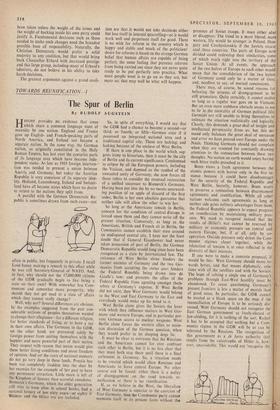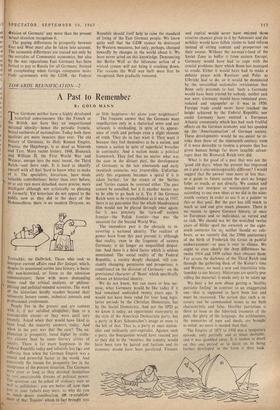TOWARDS REUNIFICATION--I
The Spur of Berlin
By RUDOLF A UGSTEIN
J4isT0Rv provides no evidence that areas which share a common language must of necesiity be one nation. England and France gave up English- and French-speaking parts of North America, and Ireland too became a separate nation. In the same way, the German nation, as originally constituted in the Holy Roman Empire, has lost over the centuries parts of its language area which have become inde- pendent states. As late as 1919 foreign interven- tion was needed to prevent a union between Austria and Germany; but today the Austrian Republic is very conscious of its separate iden- tity. Holland, Luxembourg, Ireland and Switzer- land have all become states which have rio desire to return to the nations they split from. ,
A parallel with the German Democratic Re- public is sometimes drawn from such cases—not often in public, but frequently in private. I recall Lord Ismay making a remark to this effect while he was still Secretary-General of NATO. And, in fact, why should not the 17,000,000 citizens of the GDR gradually begin to like being a state on their own? With somewhat less Com- munism and somewhat more prosperity, why should they not get used to a state of affairs which they cannot really change?
Well, why not? Several differences are obvious. In' the examples suggested from the past con- siderable sections of peoples themselves wanted to change their allegiance—for a different religion, for better standards of living, or to have a say in their own affairs. The Germans in the GDR, on • the other hand, are prevented solely by- foreign power from uniting themselves with the happier and more powerful part -of their nation. They suspect with reason that union would give them better living conditions and more freedom of opinion. And yet the roots of national memory do not go very deep in these lands. Prussia has been too completely trodden into the dust by her enemies for the example of her past to have any permanent attraction. Little more is left of the Kingdom of Saxony than scornful anecdotes. Bismarck' Germany, which the older generation still tries to keep alive in school books, had a national history of just sixty years—or eighty if Weimar and the Hitler era are included.
So, in spite of everything, I would say that the GDR had a chance to become a second—or third, or fourth,-. or fifth—German state if it possessed an integrated national area and a traditional capital city. These are lacking; and lacking because of the enclave of West Berlin.
If there is one place in the world which sug- gests irony to historians, then it must be the city of Berlin and its current significance. Condemned to eclipse by all the European powers, including the Vatican, and damned as the symbol of the unwanted unity of Germany, she now forces all those rulers to consider the eventual restoration of a unified successor to Bismarck's Germany. Having been put into the by no means unreward- ing position of an apple of discord of the first 'order, Berlin is her own absolute guarantee that neither side will allow the other to win her.
So long as the Americans remain in Berlin, concern for the condition of central .Europe is forced upon them and they cannot write off the present situation. Conversely, as long as the Americans, British and French sit in Berlin, the Communists cannot establish their state around an undisputed central city. I have not the least doubt that if General Eisenhower had never taken possession of part of Berlin, the German Democratic Republic would long since have been recognised as a state by international law. The eicistence of West Berlin alone hinders the former enemies of Germany and the two Ger- manies from accepting the status quo; hinders the Federal Republic being drawn into de Gaulle's tow; and prevents the allies of the Federal Republic from agreeing amongst them- selves at Germany's expense. If West Berlin did not exist, then West Germany would belong to the West and East Germany to the East and everybody would make up his mind to it.
West Berlin alone gives the Soviets the lever with which they influence matters in West Ger- many and western Europe, and in particular pre- vent German access to nuclear weapons. West Berlin alone forces the western allies to main- tain discussion of the German question, when they would prefer to let sleeping dogs lie.
It must be clear to everyone that the Russians and the Americans cannot for ever confront each other in Berlin, but it is no less clear that they must both stay there until there is a final settlement in Germany. So, a situation needs to be created which would allow Russians and Americans to leave central Europe. No other course can be found; either there is a policy of disengagement on the road towards re- unification or there is no reunification.
If, as we believe in the West, the liberalism of West Germany is superior to the coercion of East Germany, then the Communist party cannot maintain itself in its present form without the presence of Soviet troops. It must either alter or disappear. The trend to a more liberal, more western, life would be stronger ;n Poland, Hun- gary and Czechoslovakia if the Soviets evacu- ated -these countries. The parts of Europe now divided could redevelop their similarities, some • of which reach right into the territory of the Soviet Union. At all events, the approach of the two halves of Europe to each other would mean that the consolidation of the two halves of Germany could only be a matter of time; and, needless to say, of mutual concessions.
There may, of course, be sound reasons for believing the process of disengagement to be still premature. Quite certainly, it cannot evolve so long as a regular war goes on in Vietnam. But an even more stubborn obstacle seems to me to lie in the mentality of German political life; Germans are still unable to bring themselves to estimate the situation realistically and logically. Clearly, this demands a great deal of insight and • intellectual perspicacity from us; but this de- mand only balances the great deal of unreason and error we have poured over Europe under the Nazis. Thinking Germans should not complain when they are resented for constantly drawing attention to the connection between these two thoughts. No nation on earth would enjoy having such bitter truths preached to it.
Bonn views a fresh agreement between the atomic powers with horror only in the first in- stance because it could have disadvantages for the security of the Federal Republic and West Berlin. Secretly, however, Bonn wants to preserve a connection between disarmament agreements and reunification. While all other nations welcome such agreements as long as neither side gains military advantages from them, the Federal Republic appears to expect progress on reunification by maintaining military pres- sure. We need to recognise instead that the results of–Hitler's war cannot be reversed by military or economic pressure on central and eastern Europe, but, if at all, only by co- operation. Outside pressure only drives the Corn- munist regimes closer together, while the relaxation of tension is, at once reflected in the diversity of their interests.
If one were to make a concrete proposal, it would be this: West Germany should move to- wards better, and that means diplomatic, rela- tions with all the satellites and with the Soviets. The hope of solving a single one of Germany's problems through East-West hostility must be abandoned, To cease questioning Germany's present frontiers is less a matter of morals than of good sense. In particular, the GDR cannot be treated as a blank space on the map if the reconciliation of Europe is to be seriously dis- cussed. West Germany should not recognise the East German government as freely-elected or law-abiding, for it is nothing of the sort. Rather it has to be accepted that nothing but a Corn-
' munist regime in the GDR will be or can be tolerated by the Russians. The recognition of
this government as a de facto authority that results from the catastrophe of Hitler is, how- ever, unavoidable. This would not 'recognise the
04
division of Germany' any more than the present actual situation recognises it.
The gaping differences in prosperity between East and West must also be taken into account. The economic differences are caused not only by the mistakes of Communist economics, but also by the war reparations East Germany has been forced to pay to Russia for all Germany. Instead of complaining when foreign companies make trade agreements with the GDR, the Federal Republic should itself help to raise the standard of living of the East German people. We know quite well that the GDR cannot be destroyed by Western measures, but only, perhaps, changed inwardly by changes in the world about it. We have never acted on this knowledge. Denouncing the Berlin Wall as the infamous action of a wicked system will not bring it crashing down. The reasons the Wall was built must first be recognised, then gradually removed.



































 Previous page
Previous page